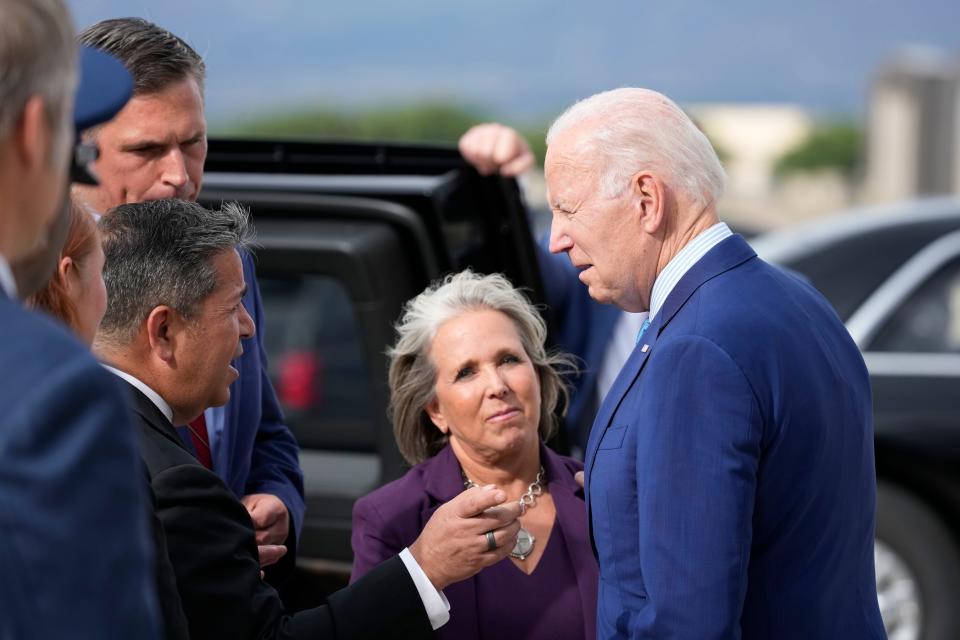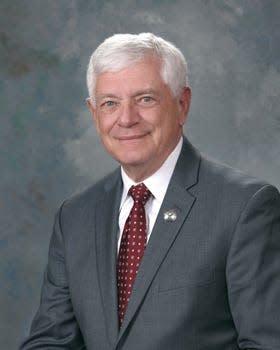Gov. Lujan Grisham vetoes tax exemption for small oil and gas wells in New Mexico
- Oops!Something went wrong.Please try again later.
Gov. Michelle Lujan Grisham vetoed a measure to exempt New Mexico’s smaller oil and gas wells from taxes paid on fossil fuels extracted, drawing the ire of Republicans and industry supporters.
Senate Bill 64, sponsored by Sen. Ron Griggs (R-34) of Alamogordo would have exempted low-performing or “stripper” wells from severance taxes operators pay to produce oil and gas in New Mexico.
It was intended to reduce expenses for small oil and gas companies in New Mexico, and specified the money saved would go to bringing these wells into compliance with state environmental rules.
More: Tax package could expand renewable energy in New Mexico; Fossil fuels also supported
SB 64 was added to House 252, a package of tax bills that passed both the House and Senate and sent to Lujan Grisham’s desk for signature into law. Before she did that, Lujan Grisham removed SB 64’s language via a line-item veto that allows governors to reject specific portions of bills before they become law.
The Independent Petroleum Association of New Mexico, which represents smaller producers, slammed the veto immediately as it was announced. President Jim Winchester said Lujan Grisham unfairly penalized oil companies that were already struggling to stay afloat.
“Governor Michelle Lujan Grisham continues her assault on small-business independent producers with her veto of the stripper well tax provision, which had bipartisan backing,” Winchester said. “This carefully crafted tax treatment would have provided measurable benefits to the environment by substantially reducing emissions from small producers’ low-production wells.”
More: New Mexico capital outlay: Here's what your county and city gets
In a message to lawmakers, Lujan Grisham argued the language only exempted certain wells based on their oil and gas production levels, wells that could be owned by large companies. Large oil companies often drill wells and then sell them to smaller companies when the wells reach the end of their lifetime.
But many large companies still own wells that would qualify as stripper wells, typically producing up to 15 barrels of oil per day, Lujan Grisham argued, meaning the tax exemption might not meet its purported purpose of supporting small businesses.
“Although I appreciate the intent behind this measure (i.e. to encourage stripper well operators to come into compliance with current regulations), the exemption should be limited to small and independent operators,” Lujan Grisham wrote.

More: New Mexico Democrats criticized for inaction on fentanyl bills
She pointed to the bill’s applicability, as written, to “the operator of a well” that Lujan Grisham contended could mean large companies that own small wells. She also said the bill needed additional language to limit the state’s revenue loss should the exemption be enacted.
“This would disproportionately benefit larger companies, substantially decrease state revenue, and work to counter my administrations climate change goals,” Lujan Grisham wrote.
She said she hoped to continue working on the language to reach a compromise on the matter ahead of next year's 60-day legislative session, in a statement emailed to the Carlsbad Current-Argus.
“I’m thankful to Senator Griggs for his leadership on this issue and I’m looking forward to tightening the language around stripper and small-producing wells ahead of the 60-day session," Lujan Grisham said.
Griggs maintained the tax exemption he sponsored was needed to bring stripper wells, often perceived as struggling to meet state requirements on air pollution emissions and other environmental impacts, into compliance with state law. He said those opposing the bill were enemies of the oil and gas industry.
More: 'Renewable' geothermal energy boosted by bill passed by New Mexico House
“It would appear that the whole goal is to do away with fossil fuel,” Griggs said. “If you produce energy cleanly, how can you say it’s bad for New Mexico?”
Oil and gas revenue made up about 40 percent of New Mexico’s revenue in the last fiscal year and was credited with driving a recent $3.5 billion budget surplus lawmakers were tasked with spending for Fiscal Year 2025.
Griggs said the industry was needed to support New Mexico’s economy, and benefits were irreplaceable by renewable energy sources like wind and solar which the final version of the tax package appeared to prop up.
More: 'Clean fuels' bill advances in New Mexico Senate, to make oil companies pay for pollution
“The revenue generated by oil and gas will not be replaced by wind and solar,” Griggs said. “The state of New Mexico could produce clean energy, be it from wind, solar or oil and gas. It looks to me like a win-win across the board.”

Environmental groups disagreed. They championed the tax package including the governor’s veto, as a bill that would boost renewable energy and electric vehicles, and aid New Mexico’s transition to decarbonized energy.
Kayley Shoup with Carlsbad-based environmental group Citizens Caring for the Future said vetoing the oil and gas exemption would force the industry to maintain a fair financial burden to continue operating in New Mexico.
More: 2024 Legislative session wrap up: Here's how energy and environment bills fared
“Oil and gas operators—not the public—should pay the compliance costs of reducing methane emissions from oil and gas operations to protect our climate and to reduce toxic air pollutants that harm public health,” Shoup said. “A tax break to the industry that is polluting the air where my neighbors and I live in the Permian Basin was simply not warranted.”
The package, as signed, included tax credits for solar and wind installations, electric vehicles and charging units and geothermal electricity production. It also adjusted New Mexico’s income tax brackets, reducing taxes for low- to middle-income levels, enacted a gross receipts tax deduction for child care services and added tax credits for families recovering from the Calf Canyon Hermits Peak Fire in 2022 – the larges wildfire in the state’s history.
Adrian Hedden can be reached at 575-628-5516, achedden@currentargus.com or @AdrianHedden on the social media platform X.
This article originally appeared on Carlsbad Current-Argus: Lujan Grisham says no to oil and gas well tax exemption, vetoes bill

